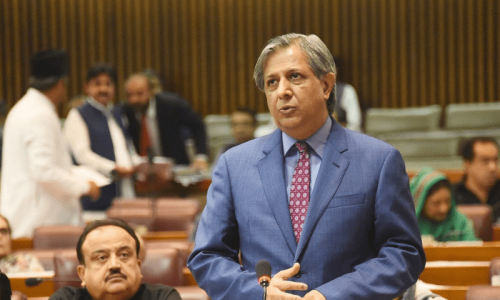THE prime minister and army chief have just wrapped up a visit to Saudi Arabia which saw them witness the ‘North Thunder’ military exercises. Held under the kingdom’s aegis, the exercises saw troops from 20 Muslim states, including Pakistan, come together for war games in Hafar al-Batin, a town located close to the Iraqi border. The drill reportedly involved thousands of troops and equipment taking part in exercises ostensibly meant to sharpen counterterrorism skills. However, considering the fractured state of the Middle Eastern chessboard and the nature of the Saudi-led coalition, there is some speculation about the ‘real’ intent of the exercises. After all, considering that the manoeuvres were explicitly designed to cement “Islamic and Arab unity”, the fact that Iraq and Syria, which fall under both categorisations, and Iran, which qualifies under the first, were not invited is fuelling speculation. Those with knowledge of the affair say “all aspects” of cooperation were discussed by the Pakistani leadership with their Saudi counterparts. But there are troubling accounts in the Saudi media by analysts who say the drill was also designed to send a message to those who ‘interfere’ in the affairs of others — a veiled reference to Iran.
Ever since the Saudi-led coalition was announced last year, Islamabad has appeared to maintain strategic ambiguity about what role this country will play in this alliance, even though Sartaj Aziz has told parliament that Pakistan will not commit ground troops to the coalition. It appears that participation in such exercises is designed to reassure the Saudis of Pakistan’s overall commitment; after all, defence cooperation between Islamabad and Riyadh goes back decades and joint military exercises are not new. However, participating in war games is one thing; committing Pakistani troops to a coalition that may invade a sovereign state is entirely another. Should this grouping be used as a vehicle to invade Syria, then Pakistan must be quite clear about where it stands.
The civil and military leadership did the right thing by resisting Saudi pressure to join the Yemeni conflict. That ruinous war has achieved very little, while aggravating the humanitarian situation in that impoverished country. As for Syria, things appear calm at this point, with the ceasefire holding. We hope this paves the way for a permanent, negotiated end to that brutal conflict. However, should things go awry and hostilities resume, and if the Saudis and their allies decided to intervene militarily in Syria, Pakistan will have to make a decision. When, and if, that time comes, this country must keep the people and parliament in the loop and not become part of any exercise that would not only violate the sovereignty of another country, but also affect the security and stability of this country, along with putting our troops in the middle of a devastating, open-ended civil war.
Published in Dawn, March 13th, 2016













































